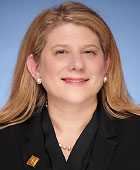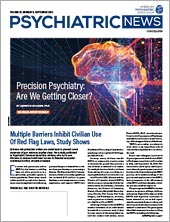As the days are growing noticeably shorter with the approach of fall, years of experiencing the “back to school season” have engraved in my bones the sense that it’s time to roll up our sleeves, reinvigorated by the longer and (perhaps) slower days of summer coming to an end, and head back to work in earnest. As I shared in last month’s column, in reality we’ve been hard at work since the Annual Meeting in May with an ambitious and successful advocacy campaign to advance psychiatry and mental health. But we are just getting started, and the fall rush this year—and this column—look inward to the profession and the work ahead in our Roadmap for the Future.
We know there is no health without mental health. We know that there was a shortage of psychiatrists even before the COVID-19 pandemic led to a greater need for mental health care than we have seen in our lifetimes. Added to that are the needs of an aging population, people with substance use disorders, and our youth—whose worlds were particularly affected by the disruption of COVID-19. Even with the proposed increases in the psychiatric workforce, there will not be enough psychiatrists to meet these demands. If we are going to rise to the challenge as psychiatrists to both lead in developing policy and practical solutions for the future and lead in the delivery and provision of mental health care to individuals in the community, in institutions, and in systems of care, we have our work cut out for us.
At the July Board of Trustees meeting, the Board began a year of strategic visioning to imagine and reimagine the future of psychiatry (“
Trustees Act on AAMC Brief in Harvard Case, Multiple Other Issues”). Using the example of APA’s responses to managed care over the past three decades, the Board explored a paradigm shift to begin work to anticipate the future and lead rather than to be in a position of responding to regulatory and business trends and corporate profit motives. Learning from APA subject matter leaders, Ethics Committee Chair Charles Dike, M.D., M.P.H., and Council on Healthcare Systems and Financing Chair Robert Trestman M.D., Ph.D., the Board explored how we can harness our professional, ethical, and care commitments to define what the field of psychiatry can do and should do in the future to ensure high-quality, evidence-based, accessible mental health care for every American. In particular, Dr. Trestman led the Board in beginning to capture the essence of what psychiatrists do and can do themselves and in relation to other medical and mental health professionals, and Dr. Dike challenged the Board to set and aspire to our ethical ideals.
One clear message that emerges repeatedly is that to advance mental health for all, psychiatrists must collaborate with our colleagues in the house of medicine and with mental health professionals to innovate and create synergy to leverage and extend psychiatric care and resources. To that end, I’m thrilled to invite all APA members—and all mental health professionals—to the first in-person, reconceived Mental Health Services Conference on Thursday and Friday, October 13 and October 14, in Washington, D.C. To kick off the conference and a future of innovation, teamwork, and collaboration, I’ve invited and joined with leaders of the American Psychiatric Nurses Association, American Psychological Association, and National Association of Social Workers to create a truly interdisciplinary meeting to address the challenges and opportunities for the future of all mental health.
Under the leadership of program chair Lawrence Malak, M.D., this meeting will bring together leaders in the mental health field to share clinical best practices, strategies to address sociopolitical determinants of health and mental health, reduce health care disparities and advance equity, and advance the goal of creating a mentally healthy nation for all.
In advance of the conference, which has a new format and innovative content grounded in APA’s commitment to community mental health, leading professionals in their fields have joined me in publishing a blog to publicize the meeting and share our collective vision of integration, collaboration, and synergy. They are Leslie G. Oleck, M.S.N., P.M.H.N.P.-B.C., president of the American Psychiatric Nurses Association; Frank C. Worrell, Ph.D., president of the American Psychological Association; and Mildred C. Joyner, D.P.S., M.S.W., L.C.S.W., president of the National Association of Social Workers. Check out “
Collaboration is Key to Meeting Demand for Mental Health Services”.
Until I see you in our nation’s capital in October, please follow me on Twitter
@Pres_APA. I look forward to hearing your bold and exciting ideas about the future of psychiatry! ■

